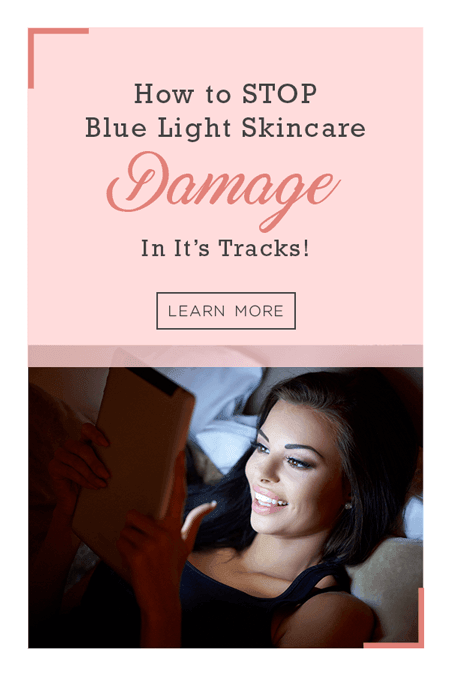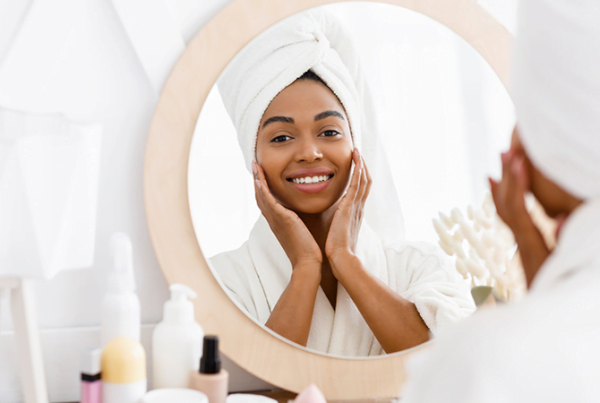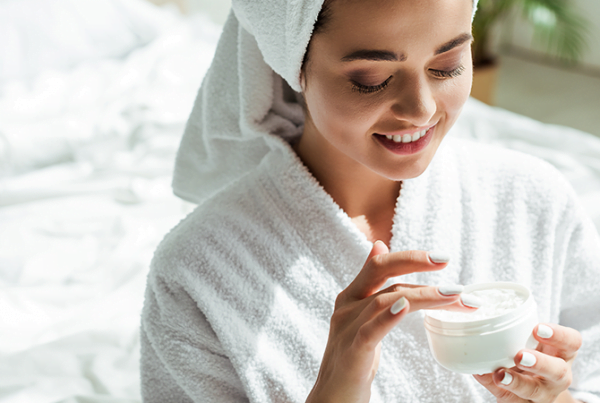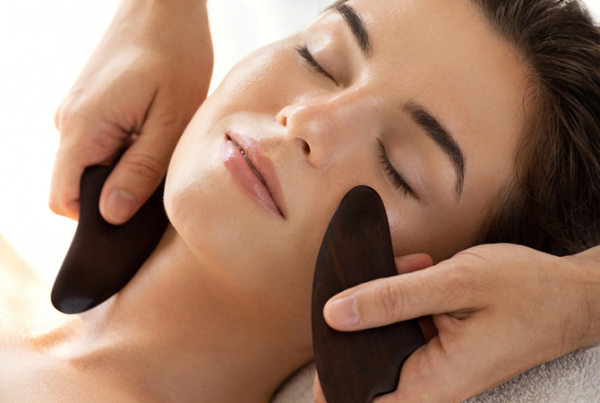
If you’re skincare conscious and have a great preventative routine, there may be a source of facial skin damage you’re not considering. Americans average around 10 hours of screen time a day. And screens emit many types of light, including blue light. The sun is also a source of blue light, but, screens are typically held much closer to our face and we generally have longer exposure to them than we do the sun.
Blue light accelerates what is known as photoaging or aging caused by overexposure to light. This can cause the skin to weaken and can promote inflammation. Plus blue light is a free radical and free radicals break down collagen and elastin in the skin. While collagen and elastin aren’t on the first layer of your skin, blue light can permeate all the way to the dermis where collagen and elastin are located. It’s even thought to contribute to some cases of hyperpigmentation.
So for now, don’t ditch your sun protection routine, but do consider tweaking your routine to include over-exposure to screen-emitted blue light.
Here’s how to prevent it.

Limit exposure
Ideally, you wouldn’t be exposed to 10 hours of blue light a day! However, this is unavoidable, especially in the professional world. So, protect yourself by purchasing a pair of blue light blocker glasses or, finding a specialized screen that filters the blue light over your computer screen, tablet or cell phone screen. This was you’ll cut down some on blue light exposure, and you’ll protect that especially delicate skin around your eyes.
Believe it or not, you can also customize the settings on your computer or phone to adjust the level of blue light. Often times, computers and cell phones are set to automatically adjust the level of blue light to emit more when necessary, such as when ambient light decreases.
If you regularly use polarized sunglasses to protect your eyes from harmful UVA and UVB rays, you’ll be happy to know these also protect you from the damaging effects of blue light exposure.
Get a blue light screen for your tech devices
If you don’t feel like installing a specialized screen for your devices, there’s always the option of adding a blue light screen protector. These are a great option for cell phones and tablets when you don’t necessarily feel like putting your blue-blocker glasses on every time you look at a text message!
Turn your phone on night mode
Just like you can adjust the settings on your devices to show you less blue light, you can also completely disable blue light in favor of yellow light. On some devices, this is a simple matter of turning the night mode setting on. This is better for both your skin and your eyes. Plus, we know that blue light interferes with sleep cycles, so setting your phone on sleep mode can help you get more rest…and sleep is great for your skin!
Avoid looking down at your phone
All of us look down at our phone dozens and dozens of times a day. It’s a habit for most of us, and one we don’t give a second thought.
But all of that looking down creates up to five times the gravitational pull on our skin, neck, and spine. This can contribute to a more jowly appearance and also create a sagging skin that ages very quickly. Blue light accelerates the damage to your neck and jawline, so, if you can’t quit the habit of looking down constantly just now, do try to put your phone on night mode.
To help prevent further damage to your neck and jawline, don’t forget to moisturize this area! The neck is often neglected in favor of facial skin, but, it’s important to moisturize this delicate skin area as well. And don’t forget to use gentle upward strokes. You don’t want to use downward strokes which can cause further damage to your skin.
Use sunscreen
Blue light causes oxidative stress. That’s why it’s key to use a sunscreen that contains antioxidants. UVA and UVB protection won’t help you with aging and damage caused by blue light. So, use a sunscreen that contains antioxidants, and you’ll have a double-duty cream. A great one is HD Defend SPF 36 which contains zinc. Zinc oxide and titanium dioxide are some of the best defenders against oxidative stress. There’s also a chemical-free version of HD Defend at SPF 30.
Look for ingredients like niacinamide and hyaluronic acid as well. These ingredients are also powerful anti-agers, and we could all use a little more of that!
Invest in a good face cream
Again, we’re going for lots of antioxidants here. Your facial skin contains and uses antioxidants such as vitamin E to defend itself from free radicals such as those that come from blue light and environmental pollution. When overexposed, your face will use up those antioxidants.
So it’s important to find and use a facial cream that contains antioxidants. We recommend the HD Replenish Advanced HA Lift, and the HD Restore Glowing Skin Serum. The HD Replenish Advanced HA Lift contains hyaluronic acid which releases antioxidants on your skin to help prevent against oxidative stress and was formulated to help prevent damage caused by environmental and digital pollution! The HD Restore Glowing Skin Serum contains antioxidants that restores the skin’s bioidentical glycolipids which protects skin from environmental aging!
Using a facial cream loaded with antioxidants will load your top layer of skin with antioxidants which will remain for hours, even if you wash the cream away. So using a good facial cream helps provide long-term protection.
It’s also important to include lots of antioxidants in your diet. Fruits and vegetables contain antioxidants but so do grass-fed and pastured meats! Grass-fed beef is higher in vitamin E than conventionally-raised beef, and it contains skin-healthy omega-3s as well.
A healthy diet can go a long way in protecting your skin from oxidative stress and damage.
Disclaimer
Screens certainly aren’t going anywhere, and they’re a necessity to get by in today’s professional and leisure worlds. However, taking some of the precautions mentioned here can help prevent skin damage, and generally, keep you healthier and more well-rested. Try making incremental goals of reducing your blue-light exposure so you’re not overwhelmed with changes. In no time at all, you’ll find you’ve reduced a lot of your blue light exposure and your skin will thank you!




